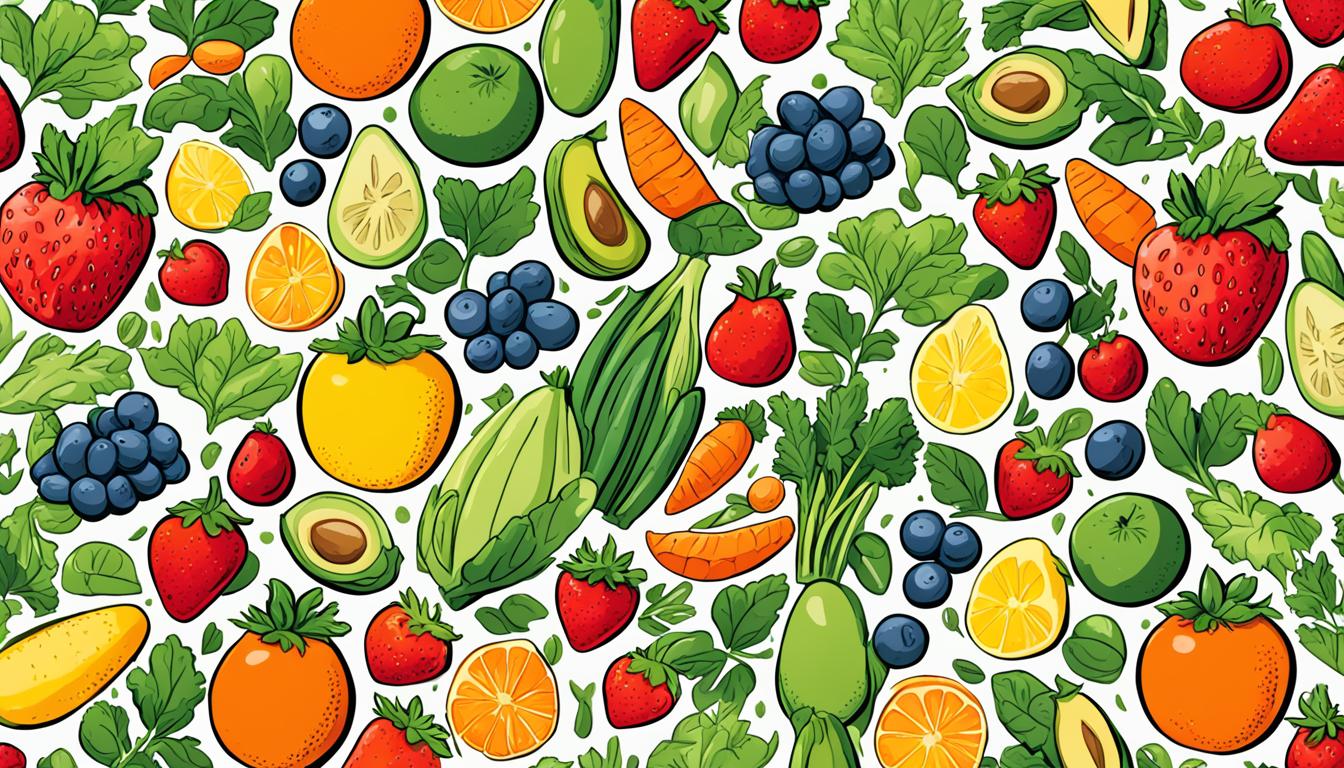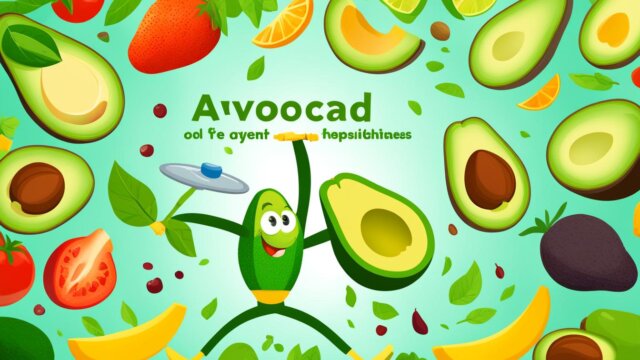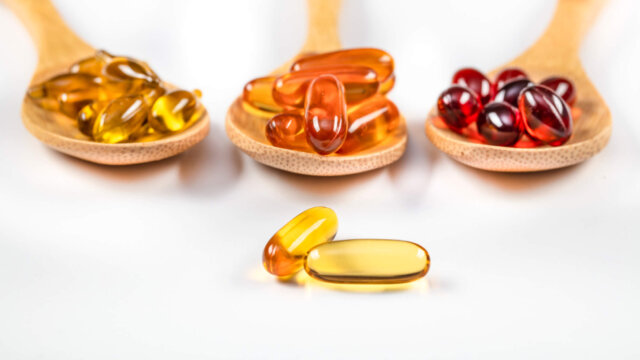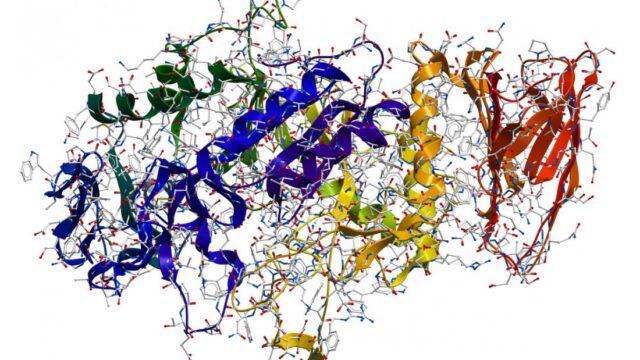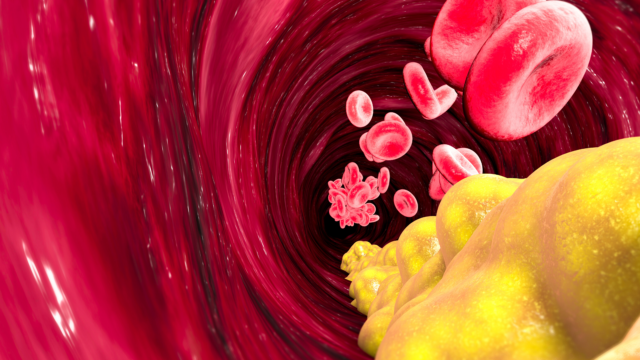FTC disclaimer: This post may contains affiliate links and we will be compensated if you click on a link and make a purchase.
Did you know that beans, lentils, and peas are great for you? They have 10–20 grams of protein per cup, plus lots of fiber and other nutrients. These foods are perfect for anyone wanting to eat more plant-based foods, including vegans, vegetarians, and those who just want to eat more meatless meals.
Now, whole food, plant-based, and plant-forward eating are all the rage. They bring us tasty and plant-rich nutrition. You can find everything from veggie-centric recipes to new meatless alternatives. So, there are lots of ways to enjoy plant-based foods today.
Key Takeaways
- Plant-based foods are packed with essential nutrients like protein, fiber, iron, and vitamins.
- Incorporating a variety of plant proteins, such as legumes, nuts, and seeds, can ensure complete amino acid profiles.
- Proper meal planning and nutrient pairing can help address potential deficiencies associated with vegetarian diets.
- Delicious and versatile plant-based cuisines offer endless possibilities for flavorful, satisfying meals.
- Embracing sustainable eating through plant-based foods can positively impact both personal and planetary health.
The Rise of Plant-Based Eating
More people are choosing plant-based eating. This move is because of benefits for health, the environment, and food innovation. In 2020, plant-based dairy and meat sales hit $29 billion. By 2030, they’re expected to reach $162 billion. Plant-based foods make up nearly 8% of the global protein market and are set to grow fivefold by 2030.
Exploring the Reasons Behind the Growing Popularity
Many factors are driving the rise in plant-based eating. People want to reduce the environmental harm from animal farming. Plant-based diets are better for the planet and offer health perks.
Studies show they can lower the risk of heart disease, diabetes, and some cancers. The plant-based food scene has gotten more exciting and easy to try. Now, plant-based meals are as tasty and complex as traditional ones. Social media has helped spread the word about plant-based living.
Health Benefits of Embracing a Plant-Forward Diet
Eating more plants is good for your health. It can lower the risk of heart disease, diabetes, and some cancers. A recent study found it can also help with weight loss and better blood sugar levels in overweight people.
Some worry about getting enough protein and vitamins from plants. But, with the right plan, a plant-based diet can give you all you need. Cost can be a barrier, but efforts are being made to make plant-based foods more affordable.
“Embracing a plant-forward diet is not only good for your health but also for the planet. The environmental benefits of reducing our reliance on animal agriculture are significant and should not be overlooked.”
Nutrient-Dense Plant Proteins
Plant-based diets often worry about getting enough protein. But plants have many nutrient-dense proteins that can fill your daily needs. Quinoa and legumes are great examples, and they are full of essential amino acids, fiber, and more.
Quinoa: A Complete Protein Powerhouse
Quinoa is called a “complete protein” because it has all nine essential amino acids. It’s also packed with fiber, antioxidants, and minerals like iron, magnesium, and phosphorus. With 8 grams of protein per cup, quinoa is a great base for plant-based meals.
Legumes: Versatile and Packed with Fiber
Legumes like lentils, chickpeas, black beans, and peanuts are very protein-rich. Lentils give you 8.84 grams of protein per half-cup, plus lots of fiber. Chickpeas add about 7.25 grams of protein to salads and bowls. Adding different legumes to your diet boosts your plant-based protein.
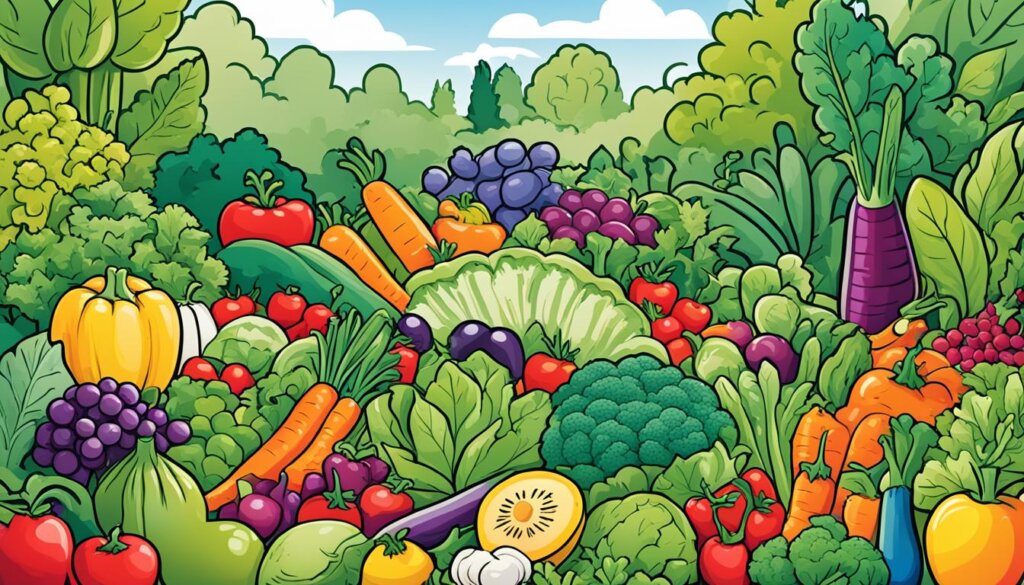
Plant Protein Source | Protein Content |
|---|---|
Firm tofu (soybean curds) | 10 g per ½ cup |
Edamame beans (immature soybeans) | 8.5 g per ½ cup |
Tempeh | 15 g per ½ cup |
Cooked lentils | 8.84 g per ½ cup |
Cooked chickpeas | 7.25 g per ½ cup |
Peanuts | 20.5 g per ½ cup |
Almonds | 16.5 g per ½ cup |
Spirulina | 8 g per 2 tablespoons |
Cooked quinoa | 8 g per cup |
Mycoprotein products | 13 g per ½ cup serving |
Chia seeds | 2 g per tablespoon |
Hemp seeds | 5 g per tablespoon |
Rice and beans | 7 g per cup |
Baked potato | 8 g per serving |
Seitan | 21 g per 1/3 cup |
Ezekiel bread | 4 g per slice |
“A varied diet of plant-based foods can provide all the essential amino acids required to meet your daily protein needs.”
Whether you’re vegan, vegetarian, or flexitarian, eating a mix of plant proteins is key for a balanced diet. With the right plant foods, you can easily get enough protein and enjoy the health perks of eating plant-based.
Plant-based Foods for Essential Nutrients
Going plant-based means making sure you get all the nutrients your body needs. Luckily, plants offer many foods that are good for you. Let’s look at two important nutrients and the tasty plant-based foods that give you these nutrients.
Leafy Greens: Abundant in Calcium
Calcium is key for strong bones; you can get it from plants easily. Leafy greens like kale, collard greens, spinach, and Swiss chard are full of calcium. You can add these greens to salads, smoothies, and many dishes. This makes sure you get enough calcium.
Nutritional Yeast: A Vegan Source of B12
Vitamin B12 is important but can be hard to get on a plant-based diet since it’s mostly found in animal foods. However, nutritional yeast is a great vegan option for B12. It tastes like cheese and can be used on food, in sauces, or to make vegan cheese. Adding nutritional yeast to your meals is an easy way to get more B12.
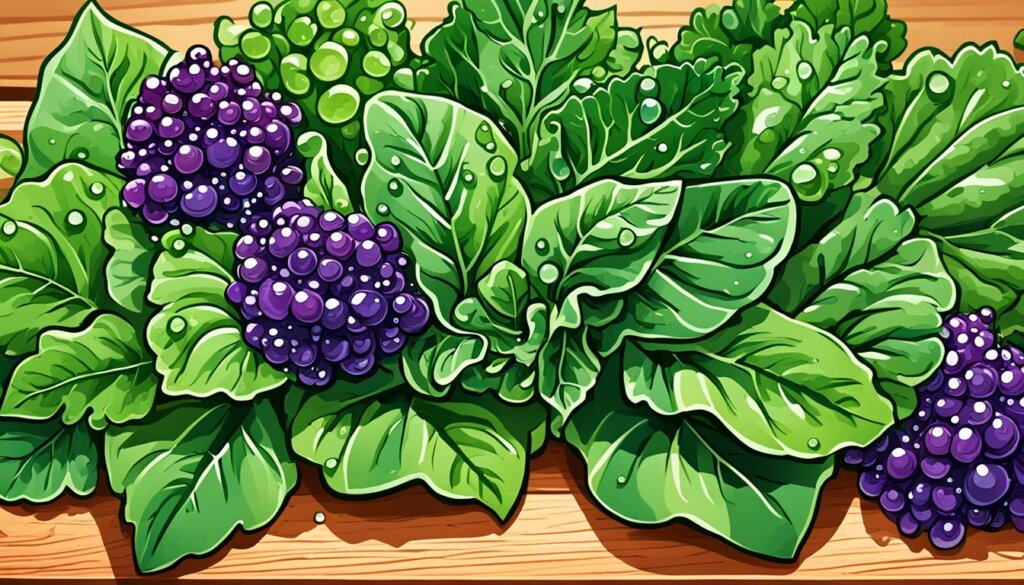
By choosing plant-based foods, you make sure your body gets what it needs to stay healthy and strong.
Healthy Fats from Plant Sources
Keeping a balanced diet means eating healthy fats from plants. These foods provide important fatty acids and have many other health benefits.
Avocados: Monounsaturated Goodness
Avocados are a great plant-based food full of healthy fats. A medium avocado has 15g of monounsaturated fats. They taste great and are full of fiber, vitamins, and minerals, making them very good for you.
Nuts and Seeds: Antioxidants and Omega-3s
Nuts and seeds are also great sources of plant-based fats. They are full of antioxidants, fiber, and omega-3 fatty acids. Flaxseeds contain a lot of alpha-linolenic acid (ALA), which is good for the brain and heart and reduces inflammation. Walnuts are high in omega-3s, which is good for a plant-based diet.
Other nuts and seeds, such as chia seeds, hemp seeds, and cacao nibs, are tasty and nutritious. They add healthy fats to your meals. You can eat them as a snack, on your breakfast, or in your favorite recipes. They can really change your plant-based eating.
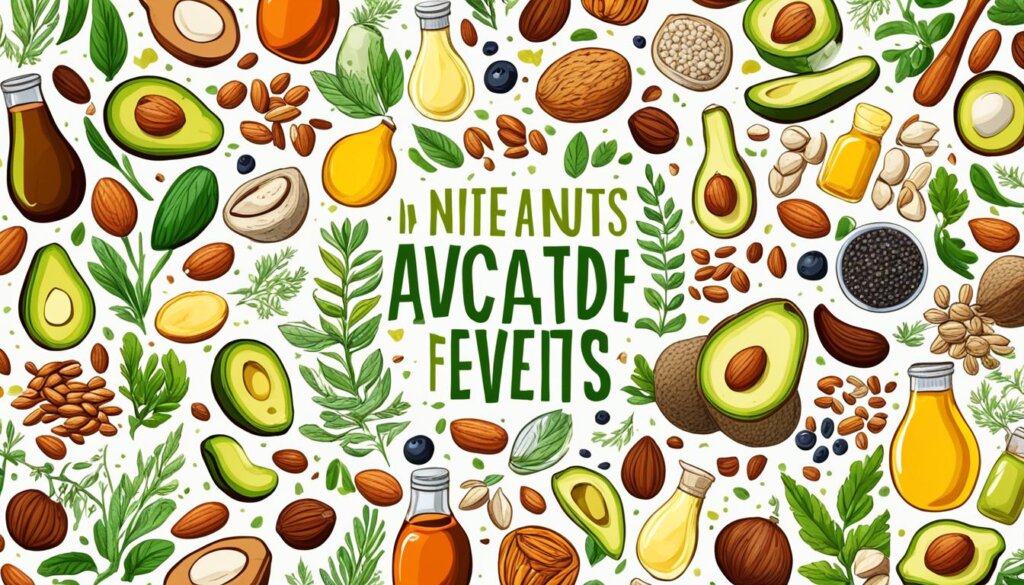
Eating the right kinds of fats, like those from plants, is important. Switching to healthier fats can help you stay healthy and feel good.
Plant-based Foods for Gut Health
Adding plant-based foods to your diet can greatly improve gut health. Plant-based diets are linked to fewer chronic diseases. They also change the gut’s bacteria balance. This is key for good digestion.
Fermented Foods: Probiotics for Digestive Balance
Fermented foods are great for gut health on a plant-based diet. Foods like tempeh, kombucha, coconut kefir, and kimchi are full of probiotics. These good bacteria help with digestion and boost immune and brain health.
Adding fermented foods or probiotics to your diet can improve your health. The gut microbiome is crucial for many health functions. Keeping it balanced is vital for good health.
Fermented Food | Probiotic Benefits |
|---|---|
Tempeh | Rich in Lactobacillus and Bifidobacterium strains |
Kombucha | Contains Lactobacillus and Acetobacter bacteria |
Coconut Kefir | Provides Lactobacillus and Streptococcus species |
Kimchi | Abundant in Lactobacillus and Leuconostoc strains |
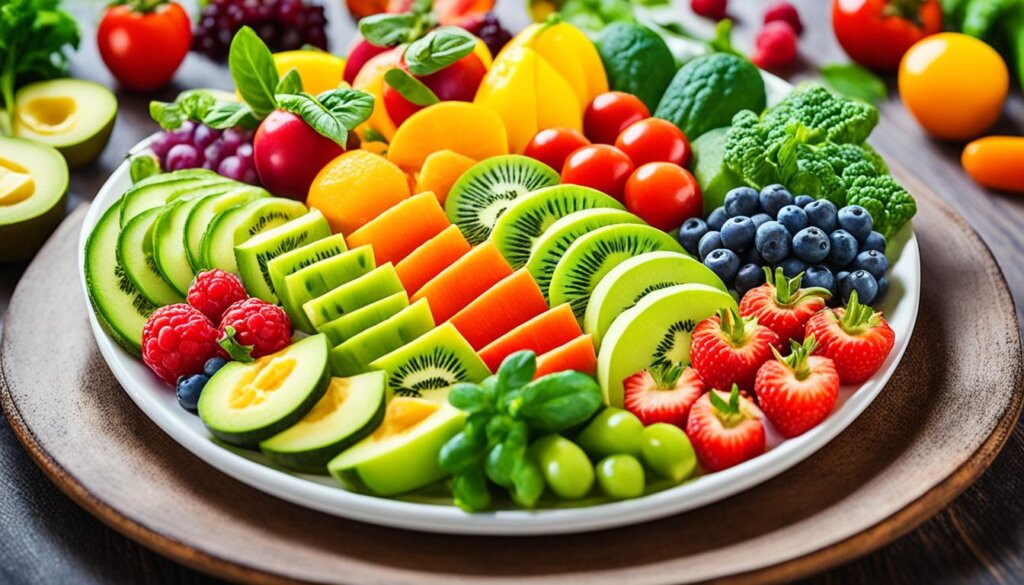
By choosing plant-based foods, especially fermented ones, you can help your gut stay healthy. This is good for your overall health. Taking care of your gut is a big step towards better health and energy.
“Fermented foods are a powerful way to support gut health and overall well-being on a plant-based diet.”
Everyone’s journey to better gut health is different. Finding the right plant-based foods for you can make a big difference. Look for resources to find what works best for you.
Versatile Vegetables for Plant-based Meals
Some veggies are stars in the world of plant-based eating. Brassicas, like cauliflower, cabbage, and broccoli, are great for nutrition and taste.
Brassicas: Nutrient Powerhouses with Crunch
Brassica veggies are full of vitamins, minerals, and antioxidants. Their crunchy texture makes them great in plant-based meals. These veggies help fight oxidative stress and some diseases and support your immune system. Plus, they’re a tasty snack that’s good for you.
Use them in stir-fries, roasts, or casseroles to make your meals better. Brassicas can make your food more exciting and healthy. They’re a key part of a plant-based diet that’s good for your health and taste.
“Brassica vegetables are a true treasure trove of nutrients, offering an abundance of vitamins, minerals, and antioxidants that can support our overall health and well-being.”
Adding more plant-based meals to your diet is a great way to get more nutrients. Brassicas and other veggies let you try new flavors and textures, making plant-based dishes that are tasty and good for you.
Plant-based Foods for Every Meal
Going plant-based doesn’t mean you have to give up flavor or nutrition. Plant-based meals can be energizing, satisfying, portable, convenient, hearty, and flavorful. You can start your day with a healthy breakfast, pack a portable and convenient lunch, or enjoy a hearty and flavorful dinner. There are many tasty options to try.
Breakfast: Energizing and Satisfying Options
Begin your day with energizing and satisfying plant-based breakfast choices. Try a smoothie with leafy greens, fruit, almond butter, or plant-based yogurt. Over 42% of adults are obese, so a good breakfast is key for a healthy day. Enjoy avocado toast or fluffy pancakes with berries and maple syrup.
Lunch: Portable and Convenient Choices
When you’re hungry in the middle of the day, grab portable and convenient plant-based lunch options. Make a colorful wrap with hummus, veggies, and sweet potato. Vegetarian diets are full of nutrients and help with weight control. Try a pasta salad with whole grains, beans, and herbs. Or, go for a black bean and veggie taco with your favorite toppings.
Dinner: Hearty and Flavorful Plant-Based Fare
End your day with a hearty and flavorful plant-based dinner. Make a creamy pasta dish with roasted veggies and a dairy-free sauce. A vegan diet can improve blood sugar and heart health in people with type 2 diabetes. Enjoy a stew or chili with beans, veggies, and spices. For a special treat, choose a plant-based burger with all the toppings.
Adding different plant-based meals to your day brings many benefits. There are endless tasty and nutritious options, from healthy breakfasts to filling lunches and dinners.
The Plant-Based Foods Revolution
The plant-based foods revolution is big news, with new products changing the food scene. Now, you can find plant-based burgers that look and taste like real meat and dairy-free milk and cheeses that feel like the real thing.
The market for plant-based foods is booming, set to hit $95.92 billion by 2028. In the US, it’s expected to grow to $8.1 billion in 2023, with a 12.2% growth rate. The UK and India are also seeing big growth, with 8.6% and 10.9% rates.
People want healthier and more sustainable food choices. In the UK, vegan numbers jumped by 1.1 million in a year. Almost half of US restaurants offer plant-based meals, a 62% jump from before. This trend is global, with China’s market expected to hit $9.4 billion in 2023.
Innovative Plant-Based Products and Meat Alternatives
New products are changing how we see meat, dairy, and other animal foods. Plant-based burgers and dairy-free milks are making it easy to eat less animal products.
Companies making these products are set to lead the market as more people choose healthier food. With growing health awareness, the future of plant-based foods looks bright. New products are coming out to meet the needs of health-conscious eaters.
Country | Plant-based Food Market Size (2023) | CAGR (Projected) |
|---|---|---|
USA | $8.1 billion | 12.2% (through 2033) |
UK | $1.48 billion | 8.6% (through 2032) |
India | $727 million | 10.9% (through 2033) |
China | $9.4 billion | 14.1% (through 2033) |
Indonesia | $480 million (2032) | 12.3% (through 2032) |
“Companies that focus on innovative plant-based products are likely to lead the market.”
Conclusion
Plant-based foods offer a wide range of tasty and healthy choices. From quinoa to leafy greens, they boost your heart health and lower diabetes risk. They also help protect against some cancers and save natural resources.
Starting a plant-based diet might seem hard, but small steps can make a big difference. Adding more fruits, veggies, whole grains, and legumes to your meals can greatly improve your health. Plus, there are more plant-based products and meat alternatives available now.
Choosing plant-based foods helps you and the planet. With lots of science backing it up, now is a great time to try this healthy and green way of living. Why not start your plant-based journey and see how it changes your life?
FAQ
What are some concerns when switching to a plant-based lifestyle?
Switching to a plant-based diet can make you worry about getting enough nutrients. You might miss out on protein, iron, amino acids, and vitamin B12 from animal proteins. It’s key to eat a variety of plant-based foods to get what you need.
What are the health benefits of plant-based eating?
Eating plants can help lower one’s risk of many diseases, including heart disease, obesity, diabetes, and cancer.
What are some nutrient-dense plant proteins?
Quinoa is packed with all nine essential amino acids you need. Legumes are also great for protein, fiber, and more.
What plant-based foods are good sources of essential nutrients?
Leafy greens like kale, spinach, and collard greens are full of calcium. Nutritional yeast is a vegan way to get vitamin B12.
What are some healthy fats from plant sources?
Avocados give you healthy fats. Nuts and seeds are full of protein, fiber, antioxidants, and omega-3s.
How can plant-based foods support gut health?
Foods like tempeh, kombucha, and kimchi have probiotics. These help keep your gut healthy, which is good for your digestion, brain, and immune system.
What versatile vegetables are good for plant-based meals?
Cauliflower, cabbage, and broccoli are full of nutrients. They make great additions to many plant-based meals and snacks.
What plant-based foods can I incorporate into meals throughout the day?
Plant-based foods can be enjoyed at any meal. Try avocado-carrot sandwiches, black bean and veggie tacos, or creamy plant-based pasta salad.
How is the plant-based food landscape evolving?
More people are choosing plant-based diets. This means more plant-based products and meat alternatives are available. It’s easier to eat less animal-based food and more plants.
